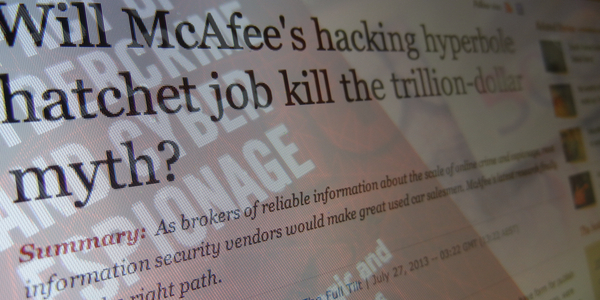 My week Monday 22 to Sunday 28 July 2013 was initially as unproductive as the previous two, but Thursday marked a turning-point. Thank the gods. No details.
My week Monday 22 to Sunday 28 July 2013 was initially as unproductive as the previous two, but Thursday marked a turning-point. Thank the gods. No details.
Articles
- Will McAfee’s hacking hyperbole hatchet job kill the trillion-dollar myth?, ZDNet Australia, 27 July 2013. Earlier today I posted links to my previous articles on dodgy cyberstats.
Podcasts
None, but I did plenty of behind-the-scenes work on the Corrupted Nerds website, including settling on Cryout Creations’ Mantra theme for WordPress as the design framework.
This fixed a very, very annoying bug that I’d encountered in some other themes that broke the RSS feeds in Blubrry’s PowerPress Podcasting Plugin for WordPress, and that in turn meant that I couldn’t add the podcasts to Apple’s iTunes store.
Having removed that roadblock, I’ll be able to add more material to Corrupted Nerds very soon — including two new episodes in the coming week.
Media Appearances
None.
Corporate Largesse
- On Thursday I attended the Sydney launch of the Nokia Lumia 925 smartphone at Simmer on the Bay, Walsh Bay, Sydney. There was food and drink, obviously, plus a showbag with: Nokia-branded jelly beans; Nokia Lumia-branded playing cards, each of which was an advert for a Windows Phone 8 application, including a QR code to download same; and a Nokia-branded pen. I have been loaned a Lumia 925 to play with for a while, and it’s my intention to try to use it as my primary phone for the whole of next week, so I can give Windows Phone 8 a fair trial. Wish me luck.
The Week Ahead
On Monday I’ll complete a catch-up edition of my ZDNet Australia column, The Full Tilt, with something that’ll probably annoy quite a few people who call themselves geeks, and then spending the afternoon in Katoomba. Somewhere in there I’ll fire up that Nokia Lumia 925.
On Tuesday I’ll write a piece for Technology Spectator, one that’s been on the back burner for a while, and completing a new episode of Corrupted Nerds: Conversations podcast. The forecast is for a rainy day, so that’s perfect.
On Wednesday morning I’ll head into Sydney to attend a media event with Vodafone Australia at 1030, then the rest of the week becomes some what flexible — although I know it include a medical appointment in Sydney, another column for ZDNet Australia and some planning.
The weekend is currently unplanned.
[Photo: Glimpse of Sydney Central, being a view of the clock tower at Sydney’s Central station, taken early one winter morning from the Metro Sydney Central hotel.]



 Monday night’s
Monday night’s 
